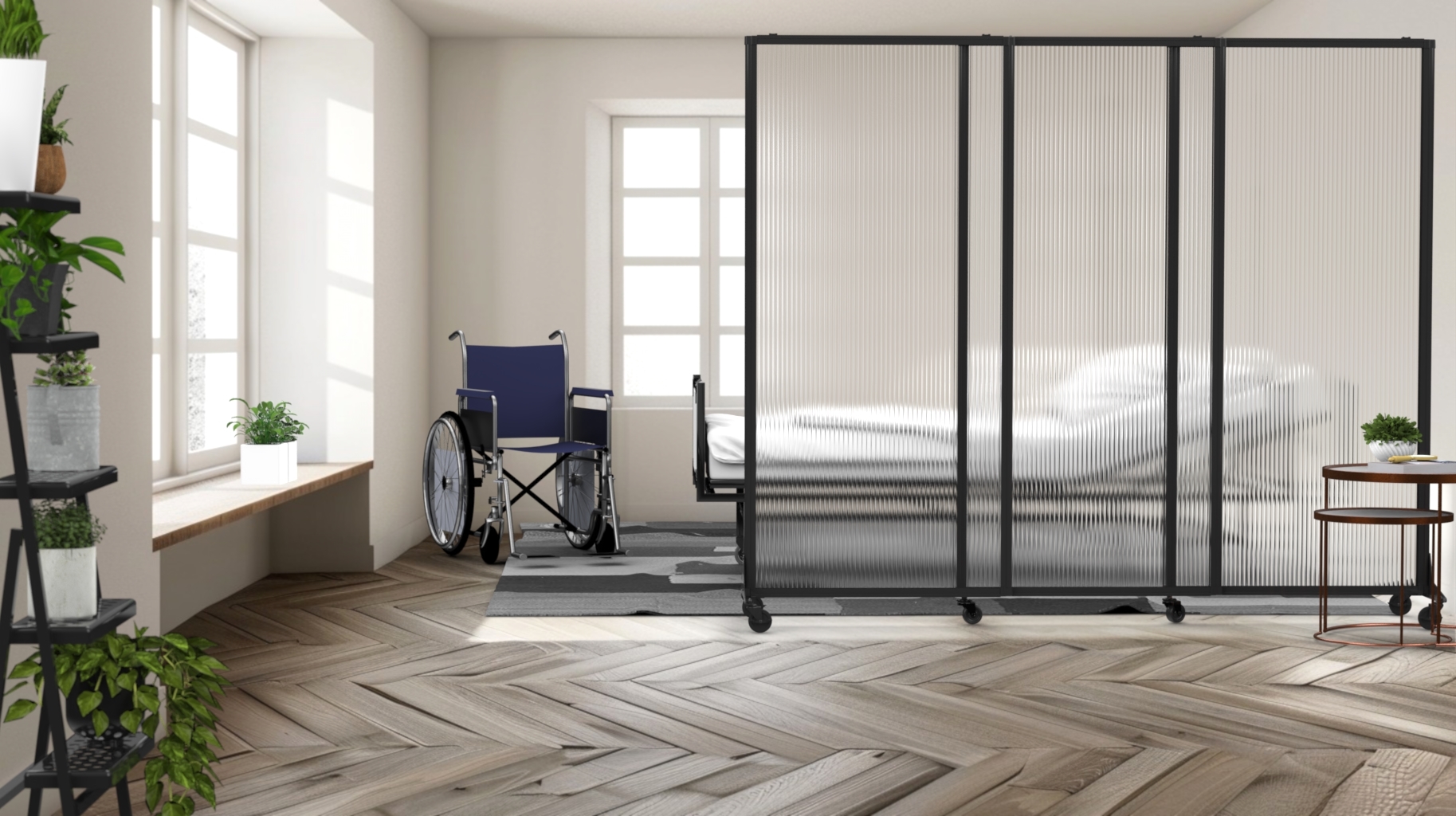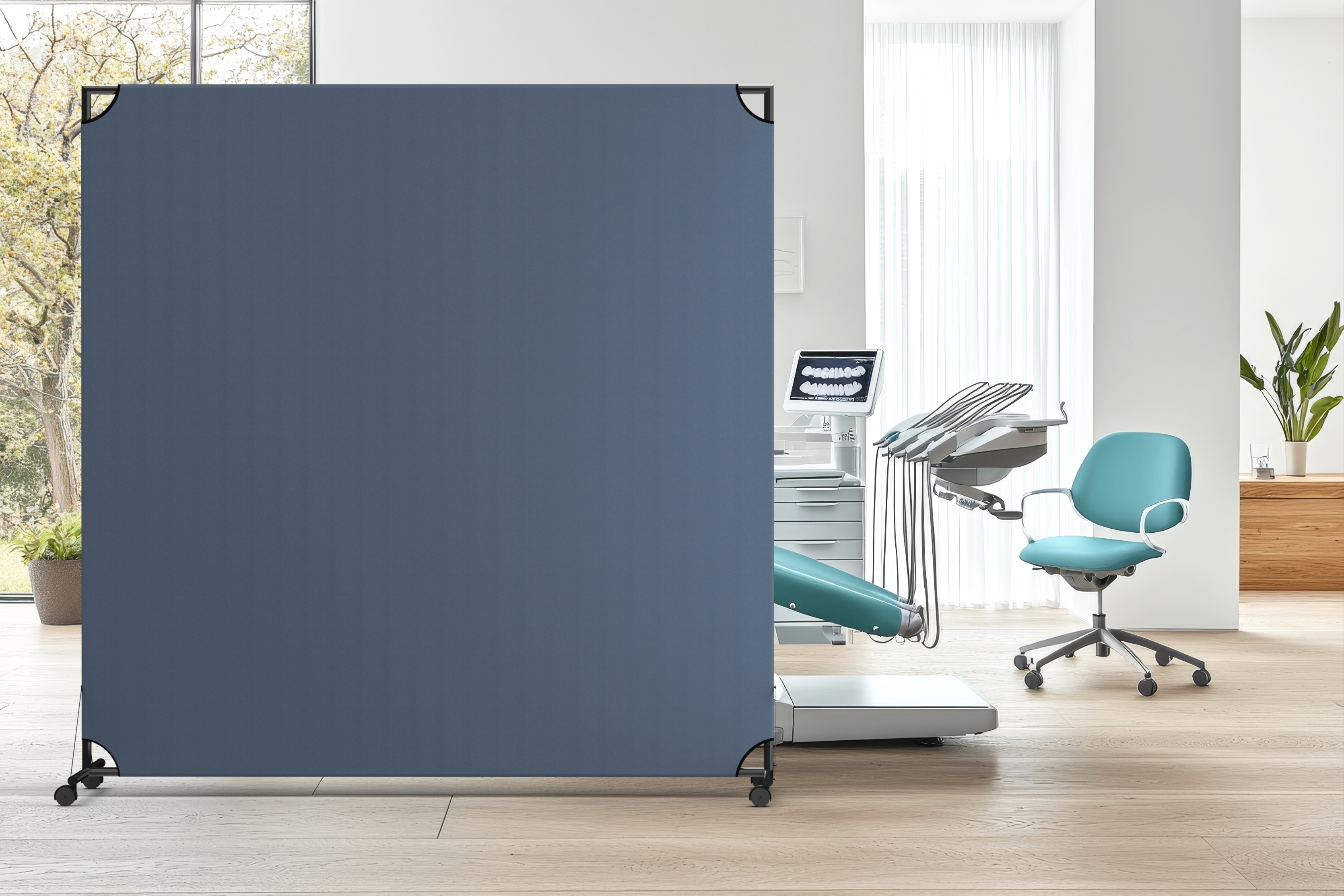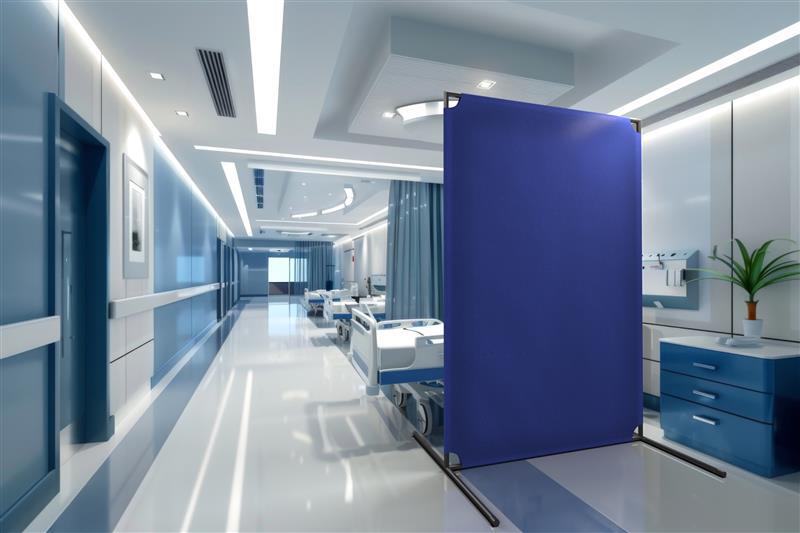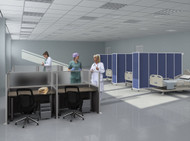How Hospital Room Dividers Improve Patient Care and Comfort
Posted by Kate Murphy on Mar 18th 2025
In the high-stakes world of healthcare, finding the right tools to enhance patient care is paramount. The focus is often on cutting-edge technology and complex medical procedures, but sometimes, the simplest solutions make the biggest difference. Enter hospital room dividers. These often overlooked, but highly effective medical privacy screens quietly transform spaces and improve patient experiences. Forget the image of flimsy, cloth curtains. Dividers are sophisticated, adaptable, and essential for modern healthcare practices.
Explore how these versatile barriers go beyond mere separation, becoming crucial components of a patient-centered environment that enhances privacy, safety, and comfort.

1. Enhancing Patient Privacy with Room Dividers
Privacy is a fundamental part of patient care. Whether in shared hospital rooms, outpatient clinics, or emergency departments, maintaining patient dignity is essential—not just for comfort, but also for regulatory compliance.
The Health Insurance Portability and Accountability Act (HIPAA) sets strict privacy guidelines to protect patient information. While electronic records receive much attention in compliance discussions, physical privacy is just as important. Room dividers create tangible, instant, private spaces for consultations, exams, and treatments, helping medical staff meet HIPAA standards while ensuring patients feel secure.
Where Privacy Screens Make a Difference
-
Shared patient rooms: Not all hospitals have individual, private rooms available. Room dividers offer a way to maintain privacy between patients without permanent construction.
-
Emergency triage areas: During peak times, hospitals need to quickly create semi-private spaces in emergency rooms and urgent care centers.
-
Outpatient and diagnostic areas: Patients receiving vaccinations, dialysis, or physical therapy benefit from private spaces where they feel less exposed.
-
Visitor management: Family members visiting patients often appreciate the added privacy that dividers provide.
2. Improving Infection Control and Safety
Hospitals constantly battle against the spread of infectious diseases. From seasonal flu outbreaks to global pandemics, infection control measures are critical to patient, staff, and caregiver safety. Airborne illnesses and pathogens thrive in enclosed environments, and hospitals, unfortunately, provide ideal conditions for their spread. Room dividers act as a physical barrier, helping to reduce the risk of cross-contamination between patients. While they are not a replacement for ventilation systems or personal protective equipment like masks or nitrile exam gloves, they serve as an added layer of defense, particularly in high-risk areas like ICUs and respiratory wards.
Not all dividers are created equal. In a healthcare environment, it’s essential that room partitions are made from materials that resist bacteria, viruses, and mold. Antimicrobial-coated and non-porous surfaces allow for quick and thorough cleaning between patient interactions, reducing the risk of surface-borne infections. Versare’s medical privacy screens are made from durable polycarbonate, which provides an easy-to-clean barrier that maintains visibility while ensuring patient privacy.
Speaking of cleaning, to sanitize polycarbonate, use mild soap and a soft cloth or sponge. Avoid ammonia or alcohol-based cleaners like Windex or Lysol, as they can damage the surface over time. For disinfection, use a diluted bleach solution. The CDC recommends a disinfecting bleach solution of 1/3 cup to 1 gallon room temperature water.
During public health emergencies, hospitals may need to rapidly expand their isolation capacity. Portable room dividers allow healthcare facilities to create temporary isolation spaces without permanent renovations. This flexibility was crucial during the COVID-19 pandemic when hospitals needed to quickly section off high-risk patients.

3. Enhancing Patient Comfort and Psychological Well-Being
Research has shown hospitalizations significantly impact adult patients’ emotional and psychological well-being, often leading to increased stress, anxiety, and depression. Factors like the admission process, length of stay, and readmissions can worsen emotional health. Another study found that psychological stress and anxiety can slow the body’s ability to recover and heal wounds.
Patients heal better in spaces that are peaceful, comfortable, and offer privacy. Design elements like natural light, calming colors, and less noise create an environment that supports both emotional and physical recovery. Various studies show that patients who feel they have little control over their health are more likely to experience depression, which can slow recovery. On the other hand, those who feel more in control of their health tend to have lower levels of depression and better recovery outcomes. By offering a simple, movable partition, hospitals can give patients a greater sense of control and privacy over their environment, leading to improved outcomes.
Hospitals are filled with constant sounds—beeping monitors, overhead announcements, patient-doctor conversations, and movement in hallways. And increased noise levels have been associated with heightened anxiety, irritation, headaches, sleep deprivation, and malaise. Room dividers with sound-absorbing properties, like the SoundSorb™ Room Divider 360® Folding Portable Partition, help dampen unwanted noise, creating a quieter and more restful environment.

Maximizing Space and Efficiency in Medical Facilities with Room Dividers
Hospital layouts must be flexible to accommodate changing needs, whether that’s responding to surges in patient volume or optimizing floor space for different types of care. Room dividers help healthcare facilities create adaptable, multi-use spaces without the need for permanent renovations.
Where Hospitals Benefit Most from Room Dividers
-
Emergency surge capacity: During flu season or health crises, hospitals can quickly set up additional patient areas.
-
Temporary isolation areas: When an outbreak occurs, partitions provide an immediate solution for isolating contagious patients.
-
Modular patient rooms: When hospitals need to adjust room layouts to meet specific needs, dividers and room pods provide a cost-effective alternative to construction.
-
Specialty treatment areas: Hospitals can create temporary spaces for procedures such as vaccinations, physical therapy, or counseling sessions.
Choosing the Right Partitions for Your Healthcare Facility
When selecting hospital room dividers and medical privacy screens, several key factors should be considered:
- Material: Choose antimicrobial and easy-to-clean surfaces to maintain hygiene. Recommended products: Versare has several polycarbonate medical privacy screens, like the MediPanel™ Portable Divider and MediWall™ Privacy Screen, as well as a sneeze shield for the clinic’s registration desk.
- Portability: Wheeled partitions offer maximum flexibility, allowing hospitals to adjust spaces as needed, and most of Versare’s hospital screens have wheels. Recommended products: The Polycarbonate Room Divider 360® Folding Portable Partition and MediWall™ Folding Partition.
- Acoustic Properties: Sound-dampening panels help create quieter environments for patient recovery. Recommended products: The SoundSorb™ Room Divider 360® Folding Portable Partition and SoundSorb™ Acoustic Panel Kit, as well as any wall-mounted acoustic panels.
- Customizability: Tailor the color, branding, or design of your dividers to match your clinic’s unique style or department, enhancing the patient experience and creating a welcoming environment. Recommended products: A Room Divider 360® Folding Portable Partition, with custom printing options, and Polycarbonate Room Divider 360® Folding Portable Partition, available in a variety of polycarbonate colors.
- Durability: Sturdy construction ensures long-term reliability, even in busy healthcare settings. Recommended products: Versare room dividers are lightweight and easy to move, featuring durable aluminum frames. All medical privacy screens are flame retardant for added safety.
A Commitment to Healthcare Solutions
From surgery centers to small-town clinics, dental offices, pharmacies, nursing homes, and veterinary practices, medical privacy screens are a simple yet effective way to transform healthcare spaces and enhance the experience for both patients and staff. Whether you need temporary and hygienic isolation areas, better privacy, or noise-reducing partitions, Versare has the perfect solution for your facility.
Visit the website to explore health-grade options or reach out for a personalized quote!


